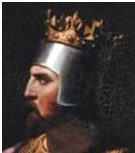|
 |
|
 |
|
|
||
Saladin Leadership
Saladin (1137-1193)
Muslim leader, born in what is now Iraq Saladin (pictured right) was brilliantly successful in the Crusades and famous for his compassion.
Why was he a great leader?
1. Purpose During his education in Damascus, Syria, he was taught his life’s aim that he always tried to achieve:
He was driven by jihad, the Islamic ideal of a holy war against Christians. But he also greatly valued education and turned Cairo, Jerusalem and Damascus into important intellectual centres. 2. Respect and kindness Despite his determination to defeat his enemies, he earned their respect by his humility, compassion and patience. He was particularly admired by Richard the Lionheart, the English king, pictured right, who defeated Saladin in 1191. When Richard was wounded, Saladin offered him the services of his personal doctor. He also gave Richard two replacements for his dead horse and fresh fruit and water, when the English king had a fever. This also allowed him to spy on Richard’s army and discovered it was not big enough to defeat him. When Saladin died, there wasn’t enough money for his grave, because he had given it all away to his troops and charity.
3. Reconciliation In his peace treaty with Richard in 1192, he allowed Christian pilgrimages into Jerusalem. He also gave Jews the right to live there. When he captured Jerusalem in 1187, he didn’t loot or seek revenge (unlike the Christians in 1099) and spared the lives of 100,000 Christians. During the siege of Acre in 1192, he cried when a Christian woman told him that his troops had snatched her child. He returned it to her, and ensured their safety. “Victory is changing the hearts of your opponents by gentleness and kindness”, he said.
4. Love of his troops and his people
a) made himself known to them. b) kindly cared for them , however tired he was. c) empathized with their problems and risked his life in battle. d) lived simply with the same clothes and food as the poor.
5. Learning He learned from a) new ideas. b) his mistakes (particularly his overconfidence that led to his disastrous defeat at the Battle of Montgisard in 1177, pictured right above). c) his uncle, Shirkuh, and Nur al-Din, the Muslim leader of Syria d) Muhammad’s compassion, and the Islamic holy book, the Qur’an.
6. Ruthless Despite his kindness, he could also be ruthless when he needed to be. Like Richard the Lionheart, he killed thousands of enemy prisoners, so that they did not have to face him again in battle.
7. Humility Saladin (pictured right) never thought himself above the law and treated everyone the same without arrogance. He believed that power means responsibilities to others.
8. Promise keeping “If we refuse what we have promised and are not generous with the benefits, no one will ever trust us again”, said Saladin
Key quote on war Beware of bloodshed; do not trust in that, for spilled blood never sleeps.
Key quotes on leadership Strive to gain the hearts of thy subjects and watch over all of their interests. I have become as great as I am because I have won the hearts of men by gentleness and kindness.
|
|
|
||
|
|
||
| Copyright © wisdomtowin.com 2025 All Rights Reserved | ||
|




 His troops and people were remarkably loyal and well motivated because he
His troops and people were remarkably loyal and well motivated because he
